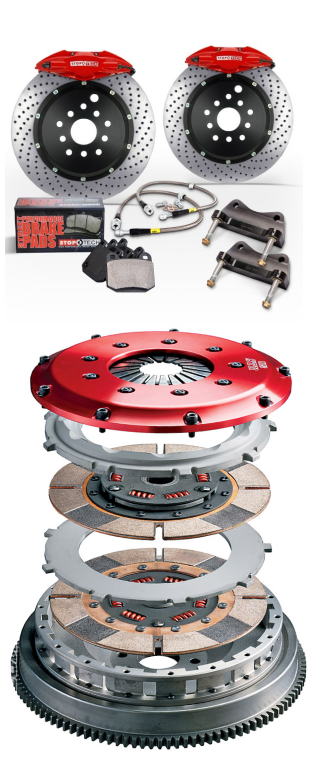From the 1950's to the 1970's, you could count on getting between 80,000 and 100,000 kms from your car's clutch. Clutches can now last for more than 130,000 kms if you use them gently and maintain them well. If not cared for, clutches can start to break down at 60,000 kms. Trucks that are consistently overloaded or that frequently tow heavy loads can also have problems with relatively new clutches. The most common problem with clutches is that the friction material on the disc wears out. The friction material on a clutch disc is very similar to the friction material on the pads of a disc brake or the shoes of a drum brake, after a while, it wears away. When most or all of the friction material is gone, the clutch will start to slip, and eventually it won't transmit any power to the wheels. The clutch only wears while the clutch disc and the flywheel are spinning at different speeds. When they are locked together, the friction material is held tightly against the flywheel, and they spin in sync. It's only when the clutch disc is slipping against the flywheel that wearing occurs. So, if you are the type of driver who slips the clutch a lot, you'll wear out your clutch a lot faster. Clutch Diagnostic Test If you find that your clutch has failed, here is an at-home diagnostic test that anyone can perform:
1) Start your car, set the parking brake and put the car in neutral.
2) With your car idling, listen for a growling noise without pushing the clutch in. If you hear something, it's most likely a problem with the transmission. If you don't hear a noise, proceed to step three.
3) With the car still in neutral, begin to push the clutch and listen for noise. If you hear a chirping noise as you press, it's most likely the clutch release, or throw-out bearing. If you don't hear a noise, proceed to step four.
4) Push the clutch all the way to the floor. If you hear a squealing noise, it's probably the pilot bearing or bushing.
Common Clutch faults are:
Below are the common clutch symptoms that you could experience when having trouble with your clutch. If you experience any of the below bring your vehicle to Clutch Mobile and one of our expert technicians will be able to perform a free clutch check and professionally diagnose the cause of the problem.
Judder Symptoms:
Severe low frequency shudder & vibration as the vehicle moves away
Cause:
Loose or worn engine mountings, misalignment of engine to gearbox, uneven operation of clutch arm, oil contaminated facings, defective pressure plate, defective driven plate, scored or glazed flywheel, worn spigot bearing
Drag/Sticking Symptoms:
Clutch won't release properly. Difficulty in engaging gears (particularly first & reverse gears) from neutral without making noise, jolt when changing gear with the vehicle in motion, vehicle moves when pedal is fully depressed.
Cause:
Incorrect clutch cable adjustments, broken or stretched cable, or lack of fluid in the hydraulic operating system, leaky or defective slave and/or master clutch cylinders, worn hydraulic system, oil contaminated facings, air in the hydraulic line, defective driving plate, buckled plate or seizure on spines, sticking plate, mismatched clutch components (not all aftermarket parts work with your clutch) seized spigot bearing or worn spigot.
Slip Symptoms:
Engine accelerates without giving a corresponding increase in vehicle speed, burning smells, vehicle will not drive up steep hills.
Cause:
Incorrect clutch adjustments, partial seizure of linkage or fouling of pedal preventing the full return of the linkage, worn clutch facings, oil contaminated facings, defective pressure plate and/or broken springs, partially seized mechanism
Hard Clutch Symptoms:
All clutches require some amount of force to depress fully. But if you have to press hard on the pedal, there may be something wrong.
Cause:
Sticking or binding in the pedal linkage, cable, cross shaft, or pivot ball are common causes. Sometimes a blockage or worn seals in the hydraulic system can also cause a hard clutch.

